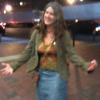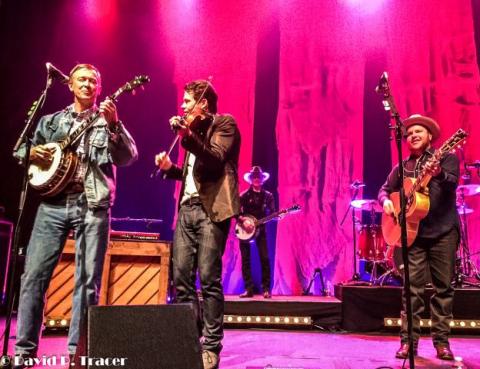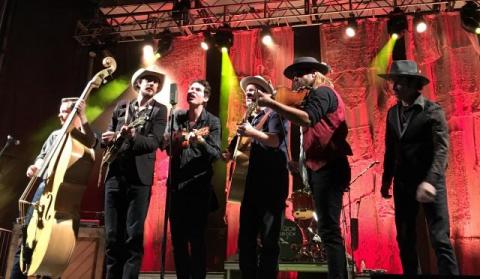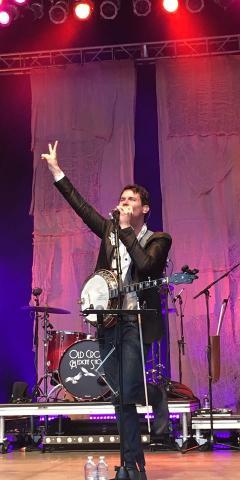50 Years of Blonde On Blonde: A Conversation with Ketch Secor of Old Crow Medicine Show

Old Crow Medicine Show is in the middle of a tour celebrating 50 years of Blonde On Blonde, performing the album start to finish (and encoring with a few additional Bob songs). The band debuted this show a year ago with two nights at the CMA Theater in Nashville, in conjunction with the “Dylan, Cash and the Nashville Cats: A New Music City” exhibit at the Country Music Hall of Fame, and they have a new live album out consisting of cuts from those shows. Old Crow is currently half-way through a US tour, then heading to the UK and the Netherlands in late June.
I had the pleasure and privilege of speaking with band leader Ketch Secor before their show in Knoxville, TN last Saturday night. We talked Bob, Blonde On Blonde, Old Crow, and got into the stories behind reworking these songs and what that was like. And, as any conversation involving Bob is inclined to do, our rap expanded backward and forward in time and space in terms of the music, the audience, and the scope it is all capable of attaining.
Stay tuned for an upcoming feature in Headin’ For Another Joint with show reviews and road tales from Old Crow’s 50 Years of Blonde On Blonde tour.
More importantly, get out there and see it for yourself if you can! You can find tour dates and ticket info on Old Crow’s website here. And you can buy the record or CD, with live cuts from last year’s Nashville dates, here.
Enjoy my interview with Ketch Secor of Old Crow Medicine Show. I sure did!
KS
Hey, this is Ketch.
CS
Hey, Ketch, this is Caroline with The Bob Dylan Fan Club. How are you?
KS
Hi, Caroline, I’m doing great, thanks. Thank you for your call.
CS
Good. Thank you for agreeing to set this up.
KS
Yeah, glad to do it.
CS
Well, again, thank you so much for granting this interview with me and with The Bob Dylan Fan Club. My Co-Director, Kait, and I are huge fans of everything that Old Crow does, and obviously also big Bob fans, so it’s kind of a match made in heaven, this confluence of Bob and Old Crow and Blonde on Blonde. I’ve been to three of the shows so far, including one of the Nashville ones last year, and I’ll be going to another three next week.
KS
Wow.
CS
So, yeah, I’m excited.
KS
I’m impressed.
CS
Well, for starters, it would be great to have you talk a little bit about your relationship with Blonde On Blonde and with Bob’s music in general and kind of how the idea for Old Crow to recreate Blonde On Blonde for its 50th birthday came to you; was there a particular conversation or moment of brilliance that inspired the idea, or was it something that you’ve been thinking about since you were a teenager? How did it all come about?
KS
Well I’ve certainly been thinking about playing Bob since I was a teenager, even younger. I’ve been thinking about Bob’s music since I first heard it when I was 11 or 12 and it was so powerful to me at that time and continued to be and just went deeper and deeper. Blonde On Blonde was never my favorite Bob record and through this project I’ve really grown to understand it and I’m probably in the 99th percentile of understanding Blonde On Blonde. It kinda went past me, right? You know, it’s funny, the things that… this is a tangent, but… I think that the main reason that I didn’t identify with this record is because I never really liked the slow drag rhythm and blues sound that this band in Nashville was making; I just didn’t identify with it. And in all of the many masks that Bob wears, that’s one of the masks that I, um, you know if I wanna hear slow drag… if I wanna hear Bob and an R & B background, I’d like From A Buick 6. I think that the New York band really rocked it. And I just don’t think that the Nashville cats translated it, for my ears, as much. But for us to reinvent it or to, you know, reappropriate Blonde On Blonde is a perfect choice because, you know, it wasn’t sacred to me. It wasn’t like… it wasn’t like Jokerman, like, what are you gonna do with Jokerman? ‘Uuhhh, I dunno, man.” (Laughs) I feel like to reinvent Jokerman, you’d have to strip it down so far, like, it would have to be like, solo banjo, like maybe a bowed instrument.
CS
That’s interesting. Well, I love all of the song arrangements and I really like the fact that some are quite true to the album versions, and others you can hear, you know, echoes of particular live versions that Bob played down the years of these songs, and some are just very different from anything Bob’s done and really veering off into new territory. I think it’s a really great and a really fun balance. Were there particular songs that when you guys were working them out came really easily or quickly, like THAT’S obviously the way Old Crow is meant to do this song? And then were there others that just took a little bit longer to reveal themselves in the way that you wanted to do ‘em?
KS
They all presented different challenges. None of them were necessarily easier than… I guess the easiest ones were the ones where we didn’t change a whole lot. But even there, if we were just copying… like, for example, our version of Just Like A Woman. That’s my interpretation, or our interpretation, of The Concert For Bangladesh Just Like A Woman. So, I mean, that wasn’t that much of a challenge because you just gotta play that guitar style in the way that he did then, and that’s such a basic arrangement that that wasn’t very hard. But something like Temporary Like Achilles, um, was hard because… again, that slow drag blues… if you’re in a band that doesn’t have an electric guitarist, it’s hard to approximate that sound so for us to make that one into what to me feels like an up-tempo Buck Owens style country number, that’s a challenge sort of… that’s a really different direction. But the challenge of knowing that there was this incredible version of Just Like A Woman worth copying was probably just as hard to come by in the long run as it was to know that you should take Temporary Like Achilles and make it fun and kinda fruity.
CS
I think that one’s really cool, it’s like a country swing dance number.
KS
Because there’s so much. Because I’ve spent, probably like you, like a good 25 years in complete immersion of Bob, a project like this, it took a really long time to amass the information to be able to make these arrangement choices the way we made them. But then, in the moment of choosing them, it actually came really quickly, cuz I’d already done all the work. I already knew…
CS
Yeah, in your head!
KM
Yeah! In my head, I knew how I wanted Most Likely You Go Your Way (And I’ll Go Mine) to sound like.
CS
Yup, that makes sense. I’d like to talk a little bit about Sad Eyed Lady Of The Lowlands. It’s an amazing song and it’s so deep and personal and so mysterious at the same time and, like, when I’ve talked to our Fan Club members and to people about this project, that’s the song that most frequently people will be like, “How would someone other than Bob DO that song?!” Not like, how dare they, but like, how would somebody pull that off, and yet, I think you pull it off really majestically and really make it your own while just giving complete, you know, tribute to it. Was it daunting to tackle that one in particular, or does it just sort of fall into… was that one also just kind of worked out in your head?
KS
No, that one was maybe the hardest one. That was the one that we saved for the end, both in the show and in the sequence of course, but also in making arrangements. We sort of pulled that one to the side and figured we’d wait and something would appear. The governing principle in many of our arrangements and this one in particular is live performance. So, Old Crow has a certain way of puttin’ on shows when we’re doing our own material. A song might be slow simply to be a springboard for the next song that's fast and, uh, you just can’t end an Old Crow show on a waltz. We play a lot of up-tempo waltzes in Old Crow and we’ve played some slow ones, too, but Sad Eyed Lady in its 50-year form was not necessarily an appropriate choice for Old Crow to close down our concert. And so, we did what we do with last song of the night before the bows – we made it big. And we made it fast. And uh... I can’t remember, there was something that tipped me off about the… you know, I took a lot of liberties with the melody and I guess I was… I think I was listening to something on Self Portrait that made me think that way… or maybe it was… yeah, yeah, it’s that Isle of Wight stuff! I can’t remember what the song was, but there was something on the Isle of Wight… parts of… maybe it was a bootleg of Mighty Quinn from Isle of Wight…
CS
And it kinda gave you the flavor for it?
KS
Yeah. Well it’s got… Or maybe it’s like a little bit of ‘…just like old Saxophone Joe...’ You know, there’s like a bounce to it...?
CS
Yeah.
KS
… to our version of Sad Eyed Lady?
CS
Yeah. You can sing along to it a lot easier than you can sing along to Bob’s!
KS
But you know, it is a really deep and personal and very… as revealing as any song on that album can get. But then at the same time it didn’t feel sacred. I feel like Blonde On Blonde, at a certain point, has to enter into the statute of limitations by which common… music becomes common wealth. And that, you know, Bob… um, that, within the life span of Bob Dylan, this should happen. These songs, they mean more than the man who wrote them, than the recordings that… um… what’s the word… I’m looking for a word that has to do with jewelry… the recordings in which they are set. Yeah, so, it just feels like it’s time to think of Bob Dylan’s music as Woody Guthrie’s music, as, you know, Scott Joplin and Stephen Foster’s music… as Brahms, and Bach.
CS
Yeah, well, you know, it’s the American way. People put stuff out there and other people pick it up and it’s all just sort of links down the chain, so… I get what you’re sayin’. So, you guys are playing Town Hall in NYC on Bob’s birthday. I think there’s probably a couple other places on the tour that you’re playing where Bob’s also played but that one has a real specialness to it, with a big breakthrough 1963 show, a lot of people called it his first major concert so, that’s pretty cool! Did you intentionally pick a place with a special magic to it to play on Bob’s birthday or did it just work out that way?
KS
It just worked out that way. There’s been divine circumstances throughout the career of Old Crow Medicine Show and particularly as they relate to Bob Dylan. There’s just been a kind of divinity to the circumstances. You couldn’t have scripted it and for a really serious hardcore Bob Dylan fan like me this stuff is like, this is like the thing that you would dream about as a teenager that is a dream I’m sure thousands and thousands of young musicians also dreamed, “Oh someday I’m gonna write a song with Bob Dylan, oh, someday I’m gonna play Town Hall and sing Bob Dylan songs.” But we actually have gotten to do just that, and then some.
CS
Are there any special surprises in store for that night, do you think?
KS
Oh, you mean, happy birthday and the candles? I don’t know!
CS
An extra song? Tomorrow Is A Long Time? (Laughs) Actually, no, don’t play that cuz I can’t be there so I’ll be really bummed!
KS
You know, one thing we haven’t done a whole lot of is really rolling out the Bob… it’s so much work to do Blonde On Blonde and then, there’s such a curve ball to our fan base, who occasionally like Bob as much as I do but oftentimes like Old Crow more. They’re our fans and, uh, and so they… you know, I feel like it’s so much to expect an audience to jive with a performance of Blonde On Blonde, you know, if you were expecting, like, hillbilly music or Old Crow standards. In the encore position, even though I could play, you know, dozens and dozens… even though we could do it, I feel like maybe we’re supposed to play more Old Crow songs or something. So, it’s something of a dilemma but, you know, my band’s been at it now for almost 20 years and we never really threw that many curveballs. We’ve really cultivated a relationship with our listeners that has sort of been the governing principle of our enterprise… so, it’s FUN to finally say, “OK, now we’re just gonna do Bob!” On this tour.
CS
Well I’m sure that you know that Bob has been covering the Great American Songbook on his last three albums, including his first ever triple album, so he’s really been focused on playing some of his favorite songs covered by people like Frank Sinatra and giving them his own spin. I’d love to hear what you think about that and just how that kind of fits into the whole flow of American and old-time music down the years that we’re talkin’ about.
KS
In the liner notes on Planet Waves, he says these songs are, uh, something like cast iron torch ballads.
CS
Cast iron songs and torch ballads, yup!
KS
And, uh, you know, they’re not. But Bob says they are and, so, we believe him. When you stack Never Say Goodbye next to um, Hoagy Carmichael or… Frank…you know, they’re really quite different. And I think that, sort of like Old Crow might have a 15-year-old fan out there who just wants to hear Old Crow, and instead we’re gonna say, “Shut up, kid, you gotta listen to Bob!” and Bob’s doing the same thing. “Shut up kid, you gotta listen to Frank!”
CS
I’ve heard you talk about Bob getting into the Country Music Hall of Fame and I think that’s something our members would be interested in hearing your thoughts on. So, do you think that’s gonna happen? Give us your opinion on that.
KS
Well I believe very wholeheartedly that Bob Dylan belongs in the Country Music Hall of Fame, that his influence on country music… that he is one of country music’s greatest contributors, both directly with his own songs that are clearly evocative of the country music form and also with his sphere of influence in the Nashville music community. You know, songs like Johnny Cash’s It Ain’t Me Babe, or the influence that he has upon outside artists, collaborations with Willie Nelson… there’s so many things about Bob that have made country music a better place. And, really, I think my angle there… because I don’t know that Bob needs any more… that Bob is the one who needs the appreciation. But if Nashville could understand, or if Nashville could embrace Bob in a new way, I think it would widen the spectrum a little bit. There’s always been a real narrow way of thinking in country music that has polarized the sound and has really altered the story of country music. When you think about Bob Dylan’s childhood, you know, the Iron Ore Range – it’s just like Butcher Holler. When you think about Bob Dylan with his ear up to an AM radio crackle, you know, he’s doin’ the same thing that Dolly Parton did. He’s doing the same thing that Charley Pride did. He’s out in a far and isolated America listening in and wondering what it’s like there in the, you know, in the deep belly of the music, and it inspires him. So, it’s such a country music story. But I think that the polarizing effect is that Nashville wants to tell a story that is rigid and narrow, in which, you know, you come to Nashville with a guitar and a dream and Nashville makes you and you sing about certain subjects and not other subjects and there’s not a lot of rabble rousers up there on that Hall of Fame wall. But it’s the rabble rousers who have really made country music rich. So, tell your readers I’m workin’ on it! And I honestly think it’s gonna happen, I really do. I’ve talked to the right people and I’m gonna keep talking to them. And make my pitch and do much more of a concerted effort. Because, you know, the Nashville records aside... even if Bob never made a record in Nashville, he belongs in the Country Music Hall of Fame. But he made four of them. And you know, Bob Johnston is a Nashville cat, and Charlie McCoy’s playin’ those guitar lines on Desolation Row. He really breathed… he really swung the gates wide open in Nashville in 1966.
CS
Well, anything else that you want to say before we wrap up here, in terms of this journey with Blonde On Blonde or Bob?
KS
Well, I guess I just really appreciate the opportunity to promote this record in your circle. You know, there’s always so many different kinds of ways to pay tribute to Bob. And some of them are really great and, you know, I’ve heard a lot of them that I didn’t like that much either. I really like the ones where Bob is paying tribute to someone else. Like right now I’m thinking about Farewell To Tarwathie – you ever heard that one? So, that’s the one that The Clancy Brothers taught Bob that he turns into Farewell Angelina. And this process – the ‘tributing’ – it’s almost like feudal or medieval in its scope, you know? It’s a very age-old system of balancing between not just intellectual property but a kind of spiritual transfer. And, if we can be a part of that -- and we are a part of that – but if we can be a part of that with this record, 50 years later, then this record continues to reach and do its work. And songs that Bob spun out in a motel room 50 years ago are now being heard and contemplated by new ears that never heard them and the potential for great change is increased. So, thanks for helping me tell the story.
CS
Oh, man, no worries. We’ll post an article on our website and share it to our Facebook page which is real active and growing all the time, so it will get some nice exposure. We also have a section on our website called ‘Headin for Another Joint’ which is kinda like a road journal where my Co-Director Kait and I share stories from the road and write-ups of Bob’s shows that we go to. It’s a more informal, fun piece and I plan on doing a feature there on your tour and my experience with it.
KS
Groovy. Thank you!
CS
Thanks, Ketch! Have a great show tonight and I will catch up with you guys in Cooperstown.
KS
OK, see ya then! Peace.



